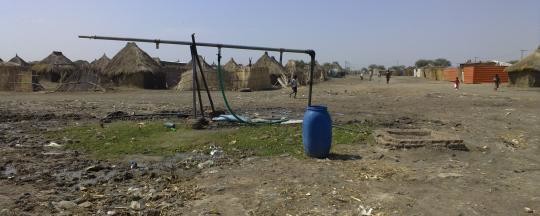The results of a new three-year scientific study show that oil production at Thar Jath and Mala fields in Unity State has polluted groundwater in the area to such an extent that it is no longer safe for human consumption.
A team of South Sudanese and German geologists found oil exploration in Unity State has made groundwater used by 180,000 people too salty to drink, and has contaminated the water with dangerous amounts of heavy metals.
According to the researchers, the source of the pollution is mud contaminated with chemicals used during oil exploration. The contaminated mud was dumped into pits which were not properly sealed, so the chemicals leaked into groundwater in local wells.
“There is a direct link between the oil exploration and production in the northern part of Unity State and the contamination of drinking water in this area,” said Klaus Stieglitz, one of the study’s authors, who is also Vice Chairman of the German organization Sign of Hope.
The study, titled “Effect of oil exploration and production on the salinity of a marginally permeable aquifer system in the Thar Jath-, Mala- and Unity Oilfields, Southern Sudan” was conducted between 2010 and 2013 and published in the peer-reviewed German journal Zentralblatt fur Geologie und Palaontologie.
The researchers tested over 100 water samples from mud pits, water wells, oil facilities, and swamps in Unity State near and far from oil fields. They used internationally-recognized methods and analyzed their water samples in a laboratory in Germany.
They found that water in over 30 shallow water wells was dangerously contaminated.
“You won’t even cook your noodles with that water. It is terrible,” said Hella Rueskamp, a geologist with AfricaWater organization who is the study’s lead author, speaking at Juba University Thursday.
Water from some wells was four times as salty as is considered safe by international health standards. The heavy metals found in the water varied, but included elements linked to chronic illnesses in humans including blood diseases.
“Sometimes it is lead, five times exceeded [the safe amount],” Rueskamp said. “Sometimes it is chrome, sometimes it is aluminum.” In general, heavy metal contamination was “between two times and up to five times higher than the limit,” she said.
The researchers found the source of the salt and the heavy metals was mud pits near oil facilities. In some mud pits, salt concentrations were over forty times the safe amount.
“This was our source for the contaminants,” Rueskamp said.
The pits were dug by oil companies to hold mud contaminated with chemicals used during oil exploration. Salt and heavy metals are often poured into oil wells during drilling activities to maintain the mud’s consistency below so the well does not collapse.
In Unity, the contaminated mud was removed after drilling and dumped into pits. The pits were not lined with any materials to prevent chemicals from leaking into groundwater.
The researchers found contaminated water wells only near oil facilities. Areas to the northwest around Bentiu and south around Leer were unaffected. They found no other sources of salt and heavy metals in the area.
The researchers said the contamination is not likely to spread, but the effects around Thar Jath and Mala may be irreversible. Tens of thousands of South Sudanese citizens around Bow and Rier villages have already abandoned their wells because of the pollution.
“The environmental damage is it is done. We cannot change things and we have to use alternative water sources,” Rueskamp said. “In these areas there is no chance to clean this first water table. You lost it completely.”
Stieglitz from Sign of Hope said there is evidence of health effects on local populations, but cautioned they have not scientifically surveyed medical problems caused by contaminated water.
“In those villages we found those populations complaining about increased problems with stomach, with diarrhea,” he said. “We have already received reports that cattle have died due to the consumption of large amounts of contaminated water, and we have seen bodies of dead cattle close to contaminated water sites.”
With their wells contaminated, citizens now take water from swamps or drums provided by oil companies. But these sources are polluted with fecal matter, soap, and other pollutants because citizens scoop water from communal drums using dirty cups or hands while people and livestock use swamps for bathing, washing, swimming, and defecating.
Rueskamp said an alternative may be to drill deep boreholes into clean aquifers that exist below the contaminated shallow water table.
John Ariki, a Juba University geologist who also authored the study, expressed concern South Sudanese authorities may not address the matter.
“The oil companies have a very strong lobby, and they can convince authorities [that the companies] are not the problem, that the problems have been there [before],” he said. “The problem lies on the reluctance of the authorities. Even if the community cries no one here will listen to their cry.”
File photo



